Do you constantly feel trapped in a cycle of racing thoughts and mental fatigue? Understanding what causes overthinking is the first step toward regaining control of your mind. Many people struggle daily without realizing that effective overthinking treatment exists. From stress and decision paralysis to sleepless nights, the consequences are real—but they are not inevitable. With targeted overthinking therapy, including cutting-edge biofeedback methods like HRV and neurofeedback, you can finally stop overthinking, retrain your brain, and regain mental clarity.
Table of Contents
Toggle- Introduction: Tired of Your Racing Mind? Here’s a Science-Backed Solution
- Types of Biofeedback Modalities for Overthinking
- How to Start Overthinking Therapy with Biofeedback
- Benefits of Biofeedback Treatment for Overthinking
- FAQ – How To Stop Overthinking
- Conclusion
- Biofeedback Device for Overthinking Management
Introduction: Tired of Your Racing Mind? Here’s a Science-Backed Solution
Do you find yourself stuck in endless loops of worry, overanalyzing every decision, or replaying conversations in your head? You’re not alone. Millions struggle daily with racing thoughts, and it can leave you feeling exhausted, stressed, and stuck.
The good news? You don’t have to live this way. Science-backed biofeedback techniques—like HRV, neurofeedback, and breathing training—offer a proven path to calm your mind, restore focus, and regain control over your thoughts. Unlike generic advice or quick-fix hacks, biofeedback-based overthinking therapy trains your brain to respond differently to stress, providing you with tools to address overthinking at its root.
In this guide, we’ll explore the causes of overthinking, explain how targeted overthinking treatment works, and demonstrate the most effective biofeedback modalities to retrain your brain and regain mental clarity.
What Causes Overthinking
Overthinking often feels automatic, but understanding what causes overthinking is key to breaking the cycle. Several factors contribute to this mental pattern:
1. Stress and Anxiety
High stress levels trigger your brain’s “fight or flight” response, making it challenging to stop racing thoughts. Even small decisions can feel overwhelming, leading to persistent overthinking.
2. Perfectionism and Fear of Mistakes
People who set extremely high standards often replay scenarios in their minds, worrying about outcomes or potential errors. This pattern fuels overthinking therapy needs.
3. Past Experiences and Trauma
Unresolved experiences, past failures, or emotional trauma can make the brain hyper-focused on potential problems, causing repeated cycles of thought.
4. Lack of Mental Training
Without strategies to regulate attention and stress, the brain can default to repetitive thinking patterns. This is where structured overthinking treatment, such as biofeedback, comes in.
5. Environmental and Lifestyle Factors
Excessive screen time, poor sleep, and constant stimulation can worsen overthinking, creating a feedback loop that keeps the mind active even when rest is needed.
Understanding these causes is the first step toward effective intervention. By identifying triggers and patterns, you can target your overthinking with therapies that are proven to retrain your brain, calm your mind, and restore focus.
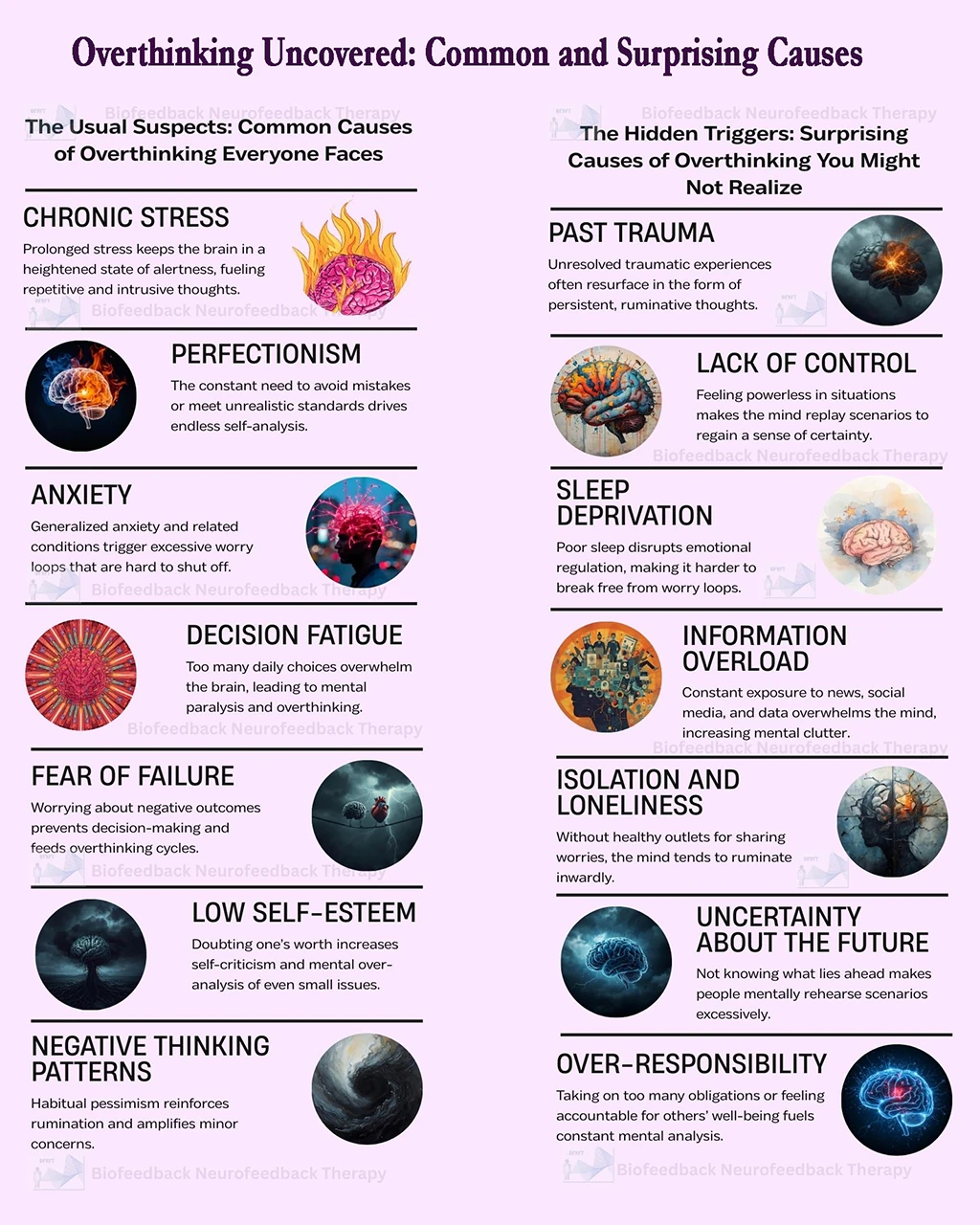
Signs You Need Overthinking Therapy
Overthinking isn’t just “thinking too much.” It’s a pattern that quietly takes over your mind, leaving you exhausted, stressed, and stuck in mental loops you can’t escape. Recognizing the signs early is the first step toward effective overthinking therapy or overthinking treatment. Here are the key indicators:
Persistent Racing Thoughts
Does your mind feel like it’s constantly spinning, reviewing conversations, decisions, or “what if” scenarios? Persistent racing thoughts can leave you mentally drained, even when nothing significant is happening in your life. Overthinking creates a loop where your brain gets stuck analyzing every detail—sometimes for hours—making it hard to relax or enjoy the present moment.
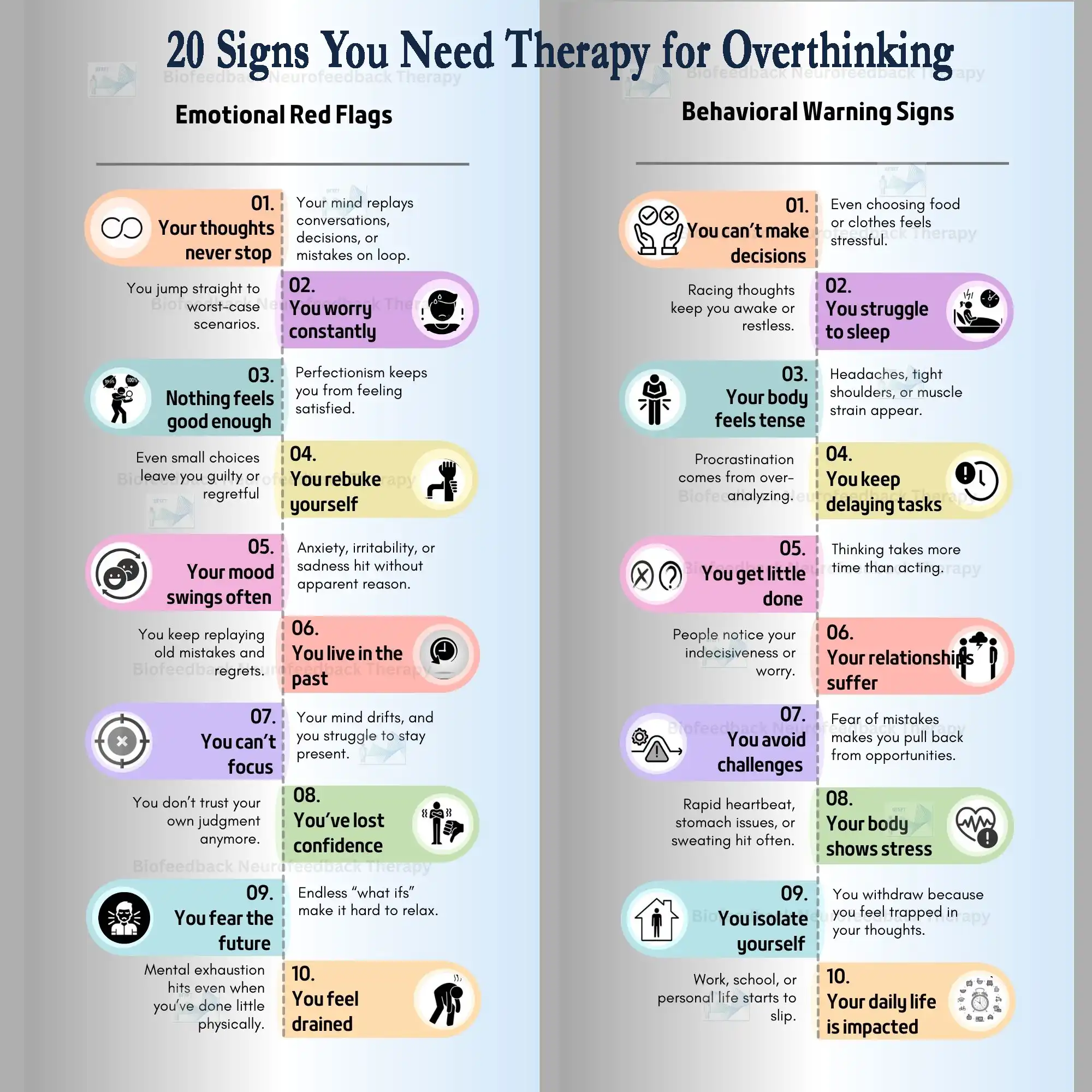
Difficulty Making Decisions
Even simple choices can feel overwhelming. “Should I respond to that email?”, “What if I make the wrong move?”. This paralysis by analysis is a hallmark of overthinking. When every decision feels monumental, it can stop you from taking action or even enjoying everyday life. Early intervention through biofeedback therapy can help your brain learn to respond calmly, rather than spiraling into a state of uncertainty.
Trouble Sleeping or Resting
Lying in bed, your thoughts race from task to task, memory to memory, worry to worry. Insomnia or restless sleep often accompanies excessive worrying or overthinking. This creates a vicious cycle: the less rested you are, the more your brain struggles to manage thoughts, which in turn exacerbates overthinking. Therapies like HRV and neurofeedback can help regulate the nervous system, allowing your mind and body to rest truly.
Physical Symptoms of Stress
Overthinking doesn’t stay in your head—it shows in your body. Tension headaches, tight shoulders, digestive discomfort, and even increased heart rate are signs that mental stress is translating into physical strain. With biofeedback treatment, you can actually monitor these bodily responses and learn to reduce them, giving you a tangible way to calm both mind and body.
Emotional Overload
Feeling irritable, anxious, or on edge over small things? Overthinking amplifies emotional reactions, making everyday stressors feel unbearable. When your emotions feel out of control, it’s a clear signal that targeted overthinking therapy is needed to retrain how your brain processes stress.
Recognizing these signs is not about labeling yourself—it’s about taking control. With the right biofeedback therapies, including HRV, neurofeedback, and breathing exercises, you can break the cycle of overthinking, reduce stress, and regain focus. The earlier you notice these patterns, the faster you can retrain your brain for clarity, calm, and emotional balance.
Biofeedback as an Overthinking Treatment
Imagine if you could see your stress and overthinking patterns in real-time—and then train your brain to respond differently. That’s precisely what biofeedback offers. Unlike generic advice or temporary coping strategies, biofeedback provides a science-backed, measurable approach to stop overthinking and retrain your brain’s responses to stress.
How Biofeedback Works
Biofeedback uses sensors to monitor your body’s physiological signals—like heart rate, muscle tension, skin conductance, and brainwaves—and gives you instant feedback. This process makes invisible stress and overthinking patterns visible, so you can learn to control them.
For example, when your heart rate spikes during anxious thoughts, HRV (Heart Rate Variability) biofeedback can teach your nervous system to calm down. Over time, your brain learns healthier responses to stress, reducing racing thoughts and mental loops that fuel overthinking.
Why Biofeedback is Effective for Overthinking Therapy
Traditional approaches, such as journaling or meditation, can be helpful, but they rely heavily on self-awareness and discipline. Biofeedback enhances these efforts by providing objective, real-time data. With consistent training, you gain:
- Greater mental clarity and focus
- Reduced emotional reactivity
- Improved decision-making
- Enhanced sleep quality
Types of Biofeedback Modalities for Overthinking
Not all overthinking is the same, and that’s why different biofeedback modalities target specific patterns in your mind and body. Each method provides unique insights and tools to help you stop overthinking effectively. Here’s a closer look:
HRV (Heart Rate Variability) Biofeedback
Your heart doesn’t just pump blood—it reflects your emotional and mental state. HRV biofeedback trains your heart and nervous system to respond calmly to stress. By practicing controlled breathing and monitoring your heart’s rhythms, you can reduce anxiety, enhance focus, and break cycles of persistent overthinking.
Neurofeedback Therapy
Neurofeedback works directly with your brainwaves, helping your mind learn healthier patterns of thought. For overthinkers, this can mean reducing excessive mental chatter, improving concentration, and fostering a sense of calm. Over time, neurofeedback can retrain the brain to process information more efficiently, making overthinking therapy measurable and effective.
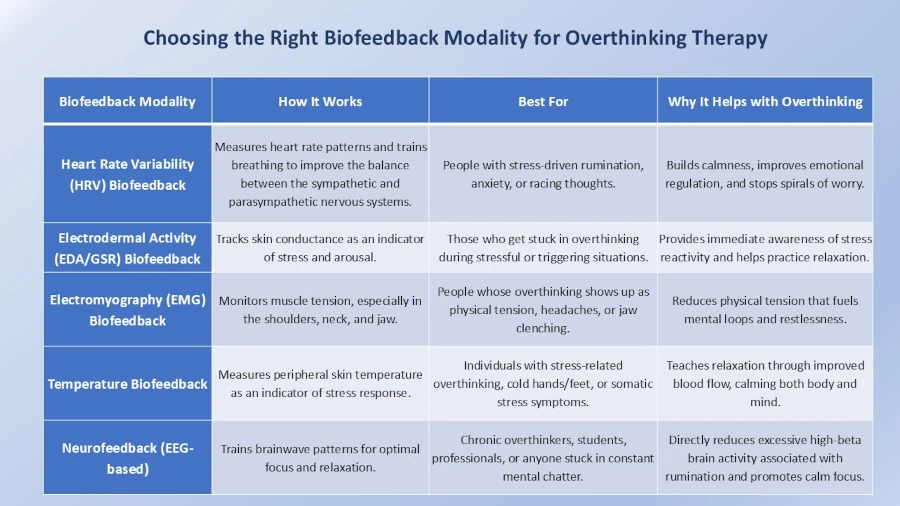
Breathing Biofeedback
Simple but powerful, breathing biofeedback teaches you to control your respiration in response to stress. Monitoring your breath in real-time helps your nervous system relax, lowering tension and slowing racing thoughts. This modality is perfect for moments of acute anxiety or when you notice yourself spiraling into overthinking loops.
GSR (Galvanic Skin Response) Biofeedback
Your skin reacts to stress through tiny electrical changes triggered by the activity of your sweat glands. GSR biofeedback monitors these changes, providing you with instant insight into how your body responds to stressors. With practice, you can learn to modulate your responses, reducing anxiety-driven overthinking before it escalates.
Temperature Biofeedback
Temperature biofeedback monitors changes in skin temperature, which often drops when the body is stressed. By learning to regulate this response, you can improve relaxation, reduce tension, and regain control over your mind during stressful situations.
EMG (Muscle) Biofeedback
Muscle tension often accompanies overthinking, especially in the shoulders, neck, and jaw. EMG biofeedback helps you recognize and release these physical tensions, which in turn calms the mind. Reducing bodily stress creates a feedback loop that makes it easier to stop overthinking naturally.
How to Start Overthinking Therapy with Biofeedback
Starting overthinking therapy may feel overwhelming at first—after all, your mind has been running nonstop for years. The good news is that biofeedback provides structured, science-backed tools to help you gradually stop overthinking and retrain your brain. Here’s how to get started:
Identify the Right Modality for You
Not every biofeedback tool is effective for everyone. Consider your primary overthinking triggers:
- Mental stress and racing thoughts: Neurofeedback or HRV biofeedback can help calm your mind.
- Physical tension and stress responses: EMG, GSR, or temperature biofeedback may be ideal.
- Acute anxiety or breathing patterns: Breathing biofeedback offers immediate relief.
Choosing the right modality ensures that your therapy addresses the specific aspects of overthinking affecting your life.
Decide Between At-Home vs. Professional Sessions
Many biofeedback devices are available for home use, allowing you to practice daily at your own pace. Professional sessions, on the other hand, offer guided instruction, personalized adjustments, and detailed progress monitoring. Some people combine both approaches to maximize benefits.
Set a Consistent Practice Routine
Biofeedback works best with regular practice. Even 10–20 minutes a day can create noticeable changes in your nervous system and brain patterns. Think of it like physical exercise: consistency is what retrains your brain and reduces overthinking.
Track Your Progress
One of the most significant advantages of biofeedback is the measurable results it provides. Monitor your heart rate, brainwaves, or muscle tension over time. Seeing tangible improvements reinforces your practice and motivates you to continue.
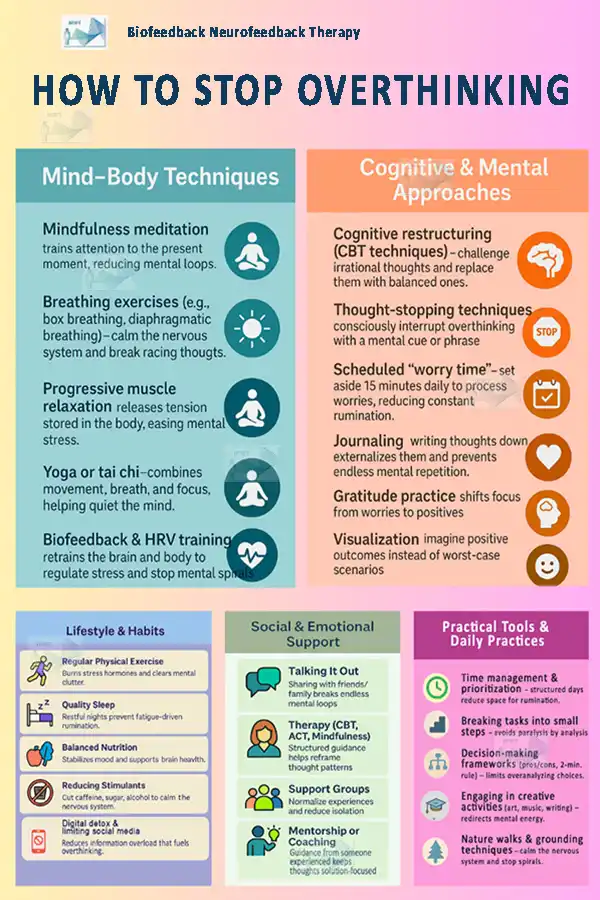
Combine With Lifestyle Adjustments
While biofeedback is powerful, combining it with healthy habits amplifies results. Adequate sleep, regular physical activity, mindfulness, and balanced nutrition all support your brain’s ability to stop overthinking and respond calmly to stress.
Starting overthinking treatment doesn’t have to be complicated. With biofeedback, you have a personalized, measurable, and science-backed pathway to retrain your brain, regain focus, and live a calmer, clearer life.
Benefits of Biofeedback Treatment for Overthinking
If you’ve ever wished for a way to calm your mind and stop spiraling into endless thoughts, biofeedback-based overthinking therapy may be the solution you’ve been searching for. By training your brain and body to respond differently to stress, biofeedback delivers measurable, lasting results. Here’s what you can expect:
Reduce Stress and Anxiety
Overthinking often drives chronic stress, making even small challenges feel overwhelming. Biofeedback helps your nervous system regulate stress responses, lowering heart rate, easing muscle tension, and calming anxious thoughts. With regular practice, your mind learns to respond to situations with calm instead of spiraling worry.
Improve Focus and Mental Clarity
Persistent overthinking can cloud judgment and make decision-making exhausting. By retraining your brain with neurofeedback and HRV biofeedback, you strengthen your attention and clarity. Tasks become easier, productivity improves, and mental fog starts to lift.
Enhance Emotional Regulation
Overthinkers often feel emotionally reactive, frustrated, or drained. Biofeedback trains your brain to recognize stress signals and respond calmly. Over time, this leads to greater emotional balance, better relationships, and improved resilience to daily challenges.
Support Better Sleep
Racing thoughts often interfere with sleep, leaving you tired and irritable. Biofeedback techniques, particularly those focused on HRV and breathing, help calm the nervous system and prepare the body for restful sleep. Improved sleep further reinforces your ability to stop overthinking during the day.
Gain Measurable Results
One of biofeedback’s unique advantages is its objective, measurable approach. You can track improvements in heart rate, brainwaves, muscle tension, and other physiological signals. Seeing tangible progress motivates you to continue your overthinking therapy and validates the effectiveness of your overthinking treatment.
In short, biofeedback doesn’t just reduce symptoms—it reprograms your brain and body, offering long-term relief from overthinking. Whether it’s reducing stress, improving focus, or enhancing emotional stability, the benefits are practical, noticeable, and life-changing.
FAQ - How To Stop Overthinking
Results vary depending on the individual and the modality used. Some people notice calmer thoughts and reduced stress within a few sessions, while consistent practice over several weeks is often needed for lasting change. Regular use of HRV, neurofeedback, or breathing biofeedback can help strengthen your nervous system, enabling you to stop overthinking more effectively.
While no therapy guarantees the instant elimination of overthinking, biofeedback offers a science-backed approach to retrain your brain. Over time, it reduces mental loops, improves emotional regulation, and equips you with tools to manage racing thoughts, making overthinking treatment far more effective than unstructured coping methods.
Yes. Biofeedback modalities, such as HRV and neurofeedback, are non-invasive, drug-free, and generally safe for most individuals. They provide measurable feedback that guides you to overthinking therapy techniques at a pace that suits your comfort and ability.
Overthinking can intensify if stress levels are high, sleep is inadequate, or lifestyle factors like nutrition, screen time, and physical activity are neglected. Biofeedback works best when combined with healthy habits, creating a holistic approach to stop overthinking.
Absolutely. Many people benefit from using a combination of HRV, neurofeedback, breathing, GSR, EMG, and temperature biofeedback. Each modality targets a different aspect of overthinking, making the overthinking treatment more comprehensive and effective.
Conclusion
Overthinking can feel overwhelming, draining your energy, focus, and peace of mind. But it doesn’t have to control your life. By understanding what causes overthinking and applying targeted overthinking therapy, you can retrain your brain and calm racing thoughts.
Biofeedback modalities—including HRV, neurofeedback, breathing, GSR, temperature, and EMG—offer a science-backed overthinking treatment that addresses both your mind and body. These techniques provide measurable feedback, teach your brain healthier responses to stress, and help you stop overthinking in a lasting way.
Taking the first step doesn’t require drastic changes. Whether through at-home devices or guided professional sessions, consistent practice can reduce stress, improve mental clarity, enhance emotional regulation, and even support better sleep.
If racing thoughts are interfering with your daily life, exploring biofeedback as a treatment for overthinking can transform the way you think, feel, and live. Start retraining your brain today and reclaim the calm, focus, and balance you deserve.
Biofeedback Device for Overthinking Management
 Sale!Get it now! 20% OFF With Code: EARLY20
Sale!Get it now! 20% OFF With Code: EARLY20€303.07Original price was: €303.07.€242.46Current price is: €242.46.

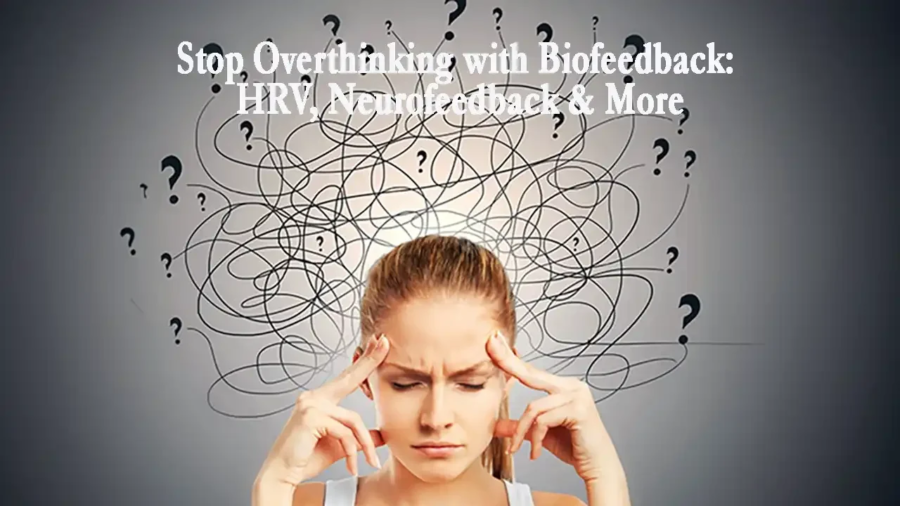




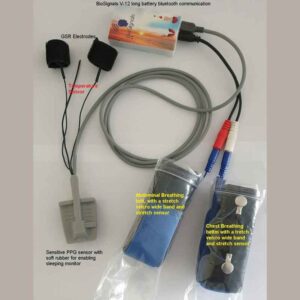





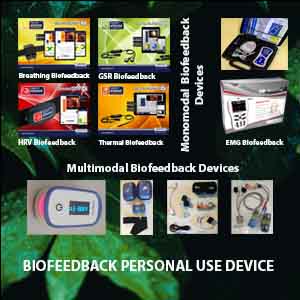
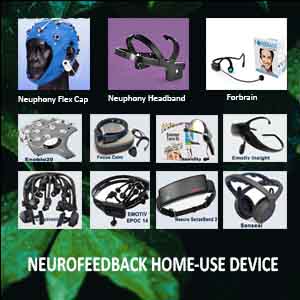
This is the ultimate mind manual! Who knew my brains relentless what if show was a treatable condition? Biofeedback sounds like the ultimate party trick: turn your stress into a video game you can win. Honestly, Im ready to trade my overthinking for a measly HRV reading and some actionable steps.
Fantastic message shared today
Your passion for helping others truly shows in every piece of content